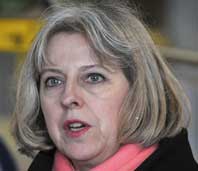The Security Service believes that since the attacks on 7-7, 2005, around 40 terrorist plots have been disrupted. There have been attempts to conduct marauding ‘Mumbai-style’ gun attacks on our streets, blow up the London Stock Exchange, bring down airliners, assassinate a British ambassador and murder serving members of our armed forces. Almost all of these attacks have been prevented by the first-class men and women of our security and intelligence services, the police, and our allies overseas.
So Home Secretary Theresa May told an audience at the defence and security think-tank in Whitehall, RUSI, in a November 24 speech. For the full speech visit the RUSI website.
She was speaking ahead of the Government will introducing a new Counter-Terrorism and Security Bill. She said that the new law will place a statutory duty on named organisations – such as schools, colleges, universities, the police, prisons, probation providers and local government – to help prevent people from being drawn into terrorism. “So for example universities will have to put in place extremist speaker policies and prisons will have to show they are dealing with extremist prisoners in an appropriate way.”
On aviation security, the law will require airlines to provide passenger data more effectively, she said, changing the law to extend a ‘no-fly’ list, and adding to the Government’s ability to impose security and screening requirements on travel to the UK. “If airlines do not give us passenger information or comply with our security screening rules, we will ensure they cannot fly to the UK.” And the Bill will amend existing law to make sure UK-based insurance firms do not provide cover for the payment of terrorist ransoms.
She summed up: “In an open and free society like ours, we can never entirely eliminate the threat from terrorism. But we must do everything possible, consistent with our values as a country, to reduce the risk presented by our enemies. The Government’s policy, our counter-terrorism strategy and this legislation all aim to do just that. We are engaged in a struggle that is fought on many fronts and in many forms. It is a struggle that will go on for many years. And the threat we face right now is perhaps greater than it ever has been and we must have the powers we need to defend ourselves.”
Labour response
Yvette Cooper MP, Labour’s Shadow Home Secretary, said: “The threat from ISIL is serious. The Government does need to do more to stop young people being groomed and radicalised to go and fight, and also deal with the threat extremists pose here at home. Labour warned four years ago that it was wrong for Theresa May to remove relocation powers for the most serious cases, and we have called repeatedly for them to be reinstated. The reduced powers allowed two terror suspects to abscond. So those powers need to be reinstated now in line with the recommendations of David Anderson, the independent reviewer for terrorism legislation.
“More should be done to disrupt the travel plans of those planning to go out to fight — and those returning should face criminal investigations and prosecutions, as well as being required to engage immediately with the Channel programme which works to de-radicalise people.
“And we need an overhaul of the Prevent programme, particularly to increase work with local communities to stop people being drawn into extremism in the first place.
“We will look at the detail of other measures when the Government’s forthcoming Bill is published. Strong powers should always be balanced by strong checks and balances, should be proportionate to the threat, and effective at keeping Britain safe and protecting our democratic values.”









